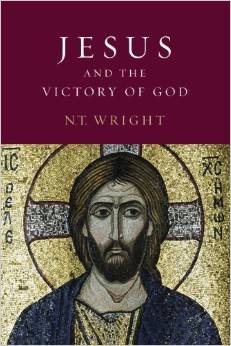N.T. Wright: Jesus and the Victory of God
 N.T. Wright, Jesus and the Victory of God: Christian Origins and the Question of God, Volume 2 (Minneapolis: Fortress Press, 1996), 741 pages, ISBN 9780800626822.
N.T. Wright, Jesus and the Victory of God: Christian Origins and the Question of God, Volume 2 (Minneapolis: Fortress Press, 1996), 741 pages, ISBN 9780800626822.
Dr. Wright approaches his study of Jesus as a Christian, a New Testament scholar, and as an historian. While his conclusions challenge many popular evangelical conceptions of Jesus, his teachings, and his mission, they also provide what I discovered to be a significantly more integrated picture of Jesus—one that “made sense” in the light of sound biblical, cultural and historical contexts, and brought new insight upon the church’s own mission and message.
Wright begins with a thorough examination of the recent “quests for the historical Jesus,” chronicling (and critiquing) scholars from Hermann Samuel Reimarus and Albert Schweitzer to Robert Funk, John Dominic Crossan, Marcus Borg, and others. Wright then offers a new direction for the “quest” that brings together both serious historical research and coherent theological reflection.
It is impossible to compress Wright’s comprehensive examination of the evidence into one simple statement. His is a well reasoned hypothesis offering a coherent conclusion that is consistent with the data, and helpful in understanding the implications of the data for the believing community.
Wright locates Jesus fully in his first-century Jewish context, and shows the reader how his message, his miracles, his public actions, and parables would have been heard in that context. Illuminating the first century Jewish expectation about the return of Israel’s god, in its various forms, Wright identifies Jesus as a prophet who is not only critiquing their practices, approaches, and expectations, but is suggesting, radically, that their expectation for the coming kingdom of God is taking place in and through himself.
The climax of Israel’s story, and indeed humanity’s story, was taking place in the life of Jesus. Because of this, or rather as an expression of this, Jesus message and actions challenged many of Israel’s traditional identity markers, such as Temple, Torah, land, and ethnic/national identity. Jesus was redrawing theses around himself. Israel was in exile, but her God was acting then and there to deliver her—and this was taking place through Jesus. As Wright comments in a section on the Last Supper, “the meal brought Jesus’ own kingdom-movement to its climax. It indicated that the new exodus, and all that it meant, was happening in and through Jesus himself” (p.557).
Wright closes this work with an examination of the crucifixion of Jesus. He explores not only the reasons for Jesus’ crucifixion (a subject of much controversy in recent months), but also a radically fresh suggestion about what Jesus believed his crucifixion meant. Jesus’ death was not simply God’s messy way of “paying” for the sins of human beings, but the means by which Israel’s God was going to conquer her enemies. Wright says in conclusion, “Unlike his actions in the Temple and the upper room, the cross was a symbol not of praxis but of passivity, not of action but of passion. It was to become the symbol of victory, but not the victory of Caesar, nor of those who would oppose Caesar with Caesar’s methods. It was to become the symbol, because it would be the means, of the victory of God” (p.610).
Category: Biblical Studies, Fall 2004


